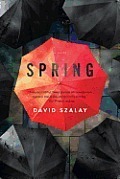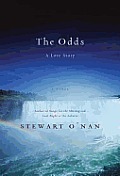Elsewhere and a Pair of Novels
1) The buzz lately seemingly everywhere's been about D'Agata and Fingal's Lifespan of a Fact. The good thing is: it's a book well deserving of lots of buzz. The bad thing is: every goddamn thing that's written about this book seems wildly off the mark. Bullshittilly bad recent NYTimes stuff here and here, and my thoughts on the thing here at the Kenyon Review blog, plus, bonus, here's an interview with Fingal and D'Agata about the book. If you give a shit about books, keep your fingers crossed that this one starts getting talked about in adult, interesting ways and unlike it's being talked about presently (which, obviously, are infantile, dull ways).
2) Other recent Kenyon stuff here and here.
3) I've got a stack of books to review and the next two weeks will hopefully see them all covered, so let's begin.
I decided in December that this year, 2012, would be the year of the novel, and Spring was among the first two or three I read. Sadly, the book hasn't seemed to get the attention it should have, which makes some measure of sense, given that the book's among the absolute most quiet narratives I've read in I can't think how long.
The novel's fairly simple to paint in broad strokes: it's a novel of a relationship between James and Katherine, and the year's 2006 and the setting's London and the only aspect of the previous that really ends up mattering at all while reading the book is that it's a novel of a relationship. Incidentals, should you be interested: Katherine works at a hotel, James works not at all in the present tense of the novel (thought he was once worth more than a million, and was part of an internet start-up of promise, about which more in a second).
The deal with the relationship at this book's heart is that it's not a good relationship. Scratch that: it's a terrible relationship—James doesn't love Katherine, nor she James, but the sparks and energy created by the narrative is in how they miss, how they each attempt to, ultimately, use each other to fill these holes in their lives, and how they both fail—in filling the holes for themselves, and in being the person able to fill the holes for the other. If nothing else, Spring would be devastating for how surgically exacting it was in dissecting an imperfect relationship.
However: there's this whole other level to Spring, which has to do with the aughts and the laziness the easy wealth of that time engendered. James is equal parts tempting and repulsive exactly because he was at one point so recently potentially worth so much—you're embarrassed for wanting to be near someone who almost was worth millions, yet it's hard to get fully away from it as well. Szalay maps that toxic area of repulsion and appeal—moral, I mean, not physical—better than anyone I've ever read.
Be appraised: this book is a quiet and slow burner. I can't say I finished it breathless and enraptured, but I can say it's been nearly two months and I haven't really shaken its spell. Read up, pronto.
Though I'm a huge O'Nan fan and have loved his last 5 or 6 absolutely without reservation, The Odds is, unfortunately, a huge miss. It's not that it's bad—O'Nan's writing's never bad—it's just that it's frustratingly blah, a novel so easy to check out of you find yourself, page 50, wondering why you're still reading (which is doubly hard in this novel, given its brevity—you feel like if you get 50 pages in, you may as well finish it, given that's nearly halfway through the thing).
Art and Marion are headed to Niagara Falls—the scene of their honeymoon—to celebrate the final days of their marriage. They're about to, for financial reasons, divorce. They're about to lose their house, and Art's been fired, and the life they've known has, in all ways, broken down (there's backstory, deeper aches: Art had an affair [heterosexual] that Marion found out about; Marion had [a lesbian] one that Art's never found out about). They're here to gamble it all: Art, mathematically inclined, has a system for playing European roulette, the odds of which are just remotely in their favor, and if they can bet big enough at the right time, they can win.
The Odds ends up being decent as character work for both Art and Marion, though best of luck finding a way to care about these two: Art's nice but feckless, and Marion's insufferably bitchy, a scene-ruiner every time she's on the page, someone who in real life would be, if not friendless, just barely put up with by friends.
Ultimately, the book's got a complicatedly earned ending, and it's fine and decent enough, but the problem is that you don't care about Art or Marion—they're just not worth the amazing firepower of O'Nan's prose and attention. You're best off skipping this one and rereading Last Night at the Lobster.










 The Odds by Stewart O'Nan
The Odds by Stewart O'Nan

